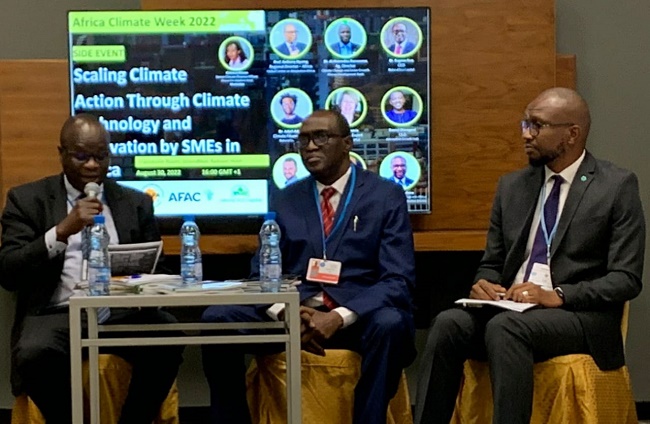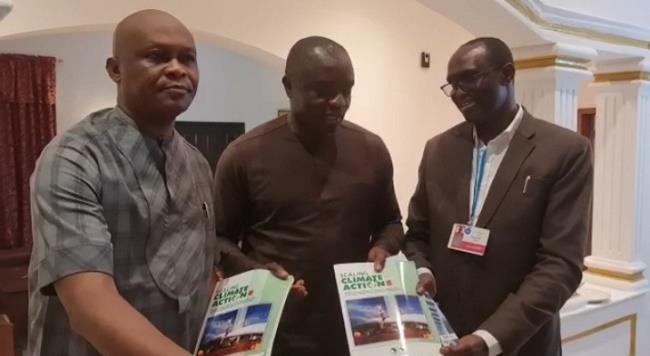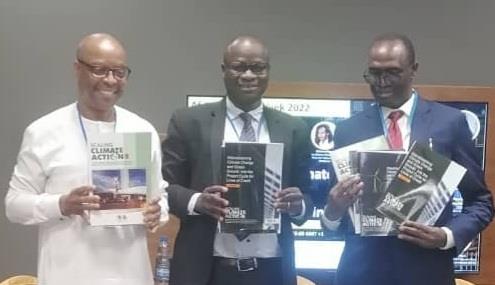Dr. Eugene O. Itua, CEO, Natural Eco Capital, in a presentation titled “Scaling Climate Action Through Climate Technology and Innovation by SMEs in Africa” at a Side Event during the Africa Climate Week 2022 on August 30 in Libreville, Gabon, stressed that private sector participation in climate action on the continent is weak and needs to be strengthened to take advantage of the abundant opportunities for green investments and climate finance

Private sector participation in climate action in Africa is weak and needs to be strengthened to take advantage of the abundant opportunities for green investments and climate finance on the continent. This is especially so of the Small and Medium-size Enterprises (SMEs) in Africa who are said to provide over 50% of Africa’s Gross Domestic Product (GDP). Thus, they form the backbone of economic growth in the continent and so must not be left behind on this journey created by each country’s NDCs.
The Nationally Determined Contributions (NDCs) provide the trajectory for low carbon development and climate resilience building in various countries.
Unfortunately, many of Africa’s SMEs are not fully aware of the NDCs with the attendant low level of appreciation of the impact of climate change, the inherent opportunities and risks, and existing mechanisms that have been designed to regulate greenhouse gas emissions.
In general, African SMEs are not conversant with the management tools that can help them unlock the opportunities for climate action in ways which support the optimisation of the operational efficiency of their businesses and enable them to attract much-needed investments.
At the same time, Local Financial Institutions (LFI) are not set up to offer attractive financial instruments to SMEs either because they do not understand how to make use of the opportunities in green finance or, how to blend green finance into traditional lending instruments.

A framework that helps SMEs in Africa to understand the opportunities and risks in climate change and embrace the NDCs as a lever for operational efficiency is, therefore, timely.
To create this understanding and indeed strengthen the capacity of financial institutions and SMEs to mobilise climate finance and scale up climate-smart investments for low-carbon development and resilience building in Africa in Africa, the African Development Bank, in partnership with the Fund for African Private Sector Assistance (FAPA), launched the Private Sector Investment Initiative for NDCs in Africa in six pilot countries – Angola, Egypt, Morocco, Mozambique, Nigeria and South Africa.
Based on this, the African Development Bank (AfDB) under the guidance of “The Climate Change and Green Growth Department”, with the mandate to support the implementation of NDCs and scaling-up climate finance in African countries from public and private sources, under the project “The Scaling Climate Action through Technology and Innovation project”, obtained the support of Natural Eco Capital to develop relevant resources that would guide SMEs and the Bank with other FIs in understanding best practices in unlocking finance and technology opportunities inherent in NDCs.
The overarching goal of the project was to assess climate risks and opportunities for NDCs and green investment.
The specific objectives included the following:
- Development of a climate change screening tool and toolkits for SMEs to mainstream climate change in key sectors.
- Development of practical working material to support SMEs analyse climate change risks/ opportunities and generate strong adaptation strategies.
- Raising awareness and strengthen the capacity of SMEs to identify incremental costs due to climate change.
- Identifying associated climate finance and climate innovation opportunities; and,
- Supporting the Bank to mainstream climate change through lines of credit in support of and develop toolkits for Bank staff and Investment Officers.
Under this initiative, Natural Eco Capital developed for the Bank a suite of climate investment tools which include:
Toolkit 1
Climate Opportunities and Risk Screening Toolkit: This toolkit focuses on helping SMEs screen their businesses for climate risks and establish strategies to protect and make these businesses climate resilient for long-term sustainability and growth, thus increasing these businesses potential access to climate finance.
Toolkit 2
Business Carbon Footprint Reporting Toolkit: This toolkit is designed to guide SMEs in measuring greenhouse gas (GHG) emissions implicated in projects and business operations and help them to reflect on ways to decrease their carbon footprint through the identification of GHG emission reduction strategies.
Toolkit 3
Guidance Note for mainstreaming climate change into lines of credit: This will assist Task Managers in the Bank to mainstream climate action protocols and criteria in AfDB’s lines of credit as well as activities of Local Financial Institutions (LFIs) that serve as financial intermediaries for SMEs.

In addition, Natural Eco Capital also developed a Green Jobs Position Paper. This Position Paper looked at the level of commitment and approach towards embracing green job across African Countries. Based on the general review, it attempts to define green jobs and their indicators as well as suggesting best approaches that can be adapted by the Bank and others towards tracking the various categories of green jobs within the pipeline of projects.
These toolkits, which build on the work of AFAC, have been specifically designed to promote the integration of climate actions into private and financial sector lending operations in African Financial Institutions. These tools will help African SMEs and financial institutions to develop and finance climate informed projects and support the implementation of the Paris Agreement in African countries.
These toolkits and guidance note are designed to promote the integration of climate actions into private sector operations at the AfDB level and at the level of other financial institutions (FIs) across Africa, thus building on the work of African Financial Alliance on Climate Change (AFAC). They have also been developed to support the African SMEs to identify incremental costs of climate measures that are eligible for climate finance at scale and encourage them to proactively pursue climate action.
We have all acknowledged that private sector participation in climate action in Africa is weak. These need to be strengthened so they can also take advantage of the abundant opportunities for green investments on the continent. We also agree that as Africa deals with the risk and impacts of climate change and other challenges, the SMEs must be fully equipped with the relevant knowledge and tools to contribute to building forward more positively.
The knowledge products or resources Natural Eco Capital developed on behalf of AfDB provide the elegant foundation and framework that stimulate opportunities for equitable and inclusive growth. You can build upon it as we collectively support the African countries to meet their NDC goals and build low-carbon and resilient climate economies.
The toolkits and the steps and indeed guidelines contained therein are flexible and can adopted and adapted by different users- SMEs, FIs, etc to meet their specific needs.
Would you get yourself acquainted with these resources or knowledge products and thus be in a position to support the African countries further as they strive to meet their NDC goals and build low-carbon climate resilient economies? Would you get better informed about these resources created to enable the SMEs and the FIs to scale-up climate action based on enhanced awareness of climate actions, opportunities, and challenges?
